After years of farming, I’ve found that babydoll sheep are truly perfect additions to any homestead or hobby farm. These charming creatures win hearts instantly with their sweet faces and adorable personalities. What makes them special is their combination of being incredibly gentle yet offering surprising productivity. Their luxurious wool is perfect for crafting wonderful things from scarves to quilts. They require low-maintenance care compared to other livestock, making morning chores a breeze. Many of my neighbors have been inspired to capture their sheep in watercolors, while I simply enjoy watching these delightful grazing companions roam my pasture each evening.
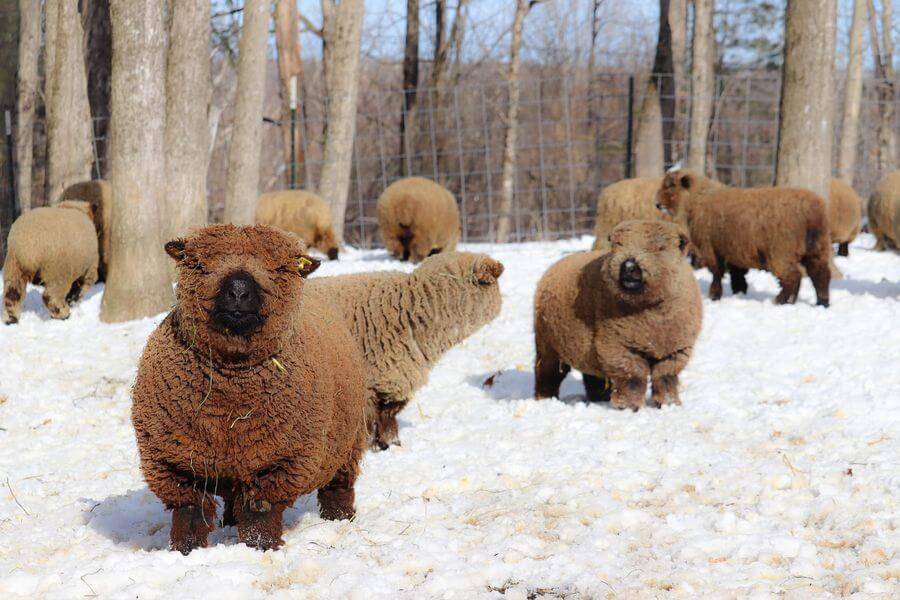
What are babydoll southdown sheep
The babydoll southdown sheep ranks among the oldest English breeds I’ve ever worked with, and they’re truly like living stuffed animals. Standing just 24″ (or 2 ft) at the withers, these Miniature Sheep maintain their endearing compact size with short legs that make them the BEST sheep for smaller acreages. What immediately captures visitors’ attention at my small farm is their woolly “teddy bear” face and perpetual perma-smile – an undeniable charm that’s impossible to resist. Their docile temperament and friendly, non-aggressive nature (being polled with no horns) makes them ideal for families with children. The ewes are particularly excellent mothers, often raising twins or even triplets with remarkable ease, though at places like Tanglewood where I occasionally volunteer, mama sheep sometimes need milk bottles to supplement feeding.
These delightful creatures originated in Australia from woolly-headed Southdowns and have maintained their short, woolly sheep roots while other breeds evolved toward longer, leaner builds. As efficient cud-chewing animals with four-chambered stomachs, these ruminants thrive on simple grass diets. Their breeding season runs from August to December, with a gestation period of five months, typically resulting in baby lambs arriving in spring. These lambs are usually weaned between eight to twelve weeks. Due to their small size, good meat qualities, and remarkably easy handling, they’ve become increasingly valuable in vineyards, orchards, and small farms where their natural grazing helps with vegetation management without damaging crops.
The Story of Babydoll Sheep
The Babydoll Sheep has one of the most fascinating histories among sheep breeds. Originating in the late 1700s from the South Down hills of Sussex County, England, these animals were treasured for their extreme hardiness and good flavored meat. John Ellman worked to standardize the breed around 1780, establishing its consistent characteristics. However, by the 1900s, their small size made them less economical as farming became more industrial. What’s remarkable is how these sheep were nearly lost to history not once but twice – first after World War II when demand shifted toward larger cuts of meat, and again in the late 1980s when only 350 sheep remained worldwide.
The breed’s savior, Robert Mock, spent four years tracking down the last purebred flocks. His dedication saved from extinction this wonderful breed, which was then rebranded as Olde English Babydoll Southdowns to avoid confusion with their larger relatives. What makes them so special is their compact, woolly-headed build and dual-purpose nature, providing both quality meat and luxurious wool. Standing just 45cm to 61cm tall, they display that unforgettable Babydoll smile that instantly captured my heart when I first encountered them. They’re absolutely perfect for small farms, vineyards, and orchards where their gentle grazing habits benefit the land.
Their easy-going temperament and good mothering instincts have made them a true favorite among shepherds like myself. Having raised Babydolls for over a decade, I’ve witnessed firsthand how their vigorous lambs – often born as twins or triplets – thrive with minimal intervention. The strict registry established in 1991 ensures the breed’s best traits are preserved: short stature, well-muscled body, dark hooves, and that signature smiling look created by their wide lower jaw. Today, these sheep are enjoying a remarkable resurgence, even returning to their homeland England in January 1999. Their history, attractive appearance, and practicality on small acreage make them a cherished living piece of agricultural heritage that I’m proud to steward.
Size & Appearance
Babydolls stand just 18-24 inches tall at the shoulder when fully mature (around age two), making them perfectly sized for hobby farms where space is limited. At 5’2″ myself, I appreciate that their grazing height reaches only knee-height—a real back-saver during shearing season or when trimming hooves. While registry breed standards cap height at 24 inches, my personal flock tends toward the daintier side, averaging 18 inches tall. The ewes typically weigh 50 to 60 pounds, considerably lighter than other breeders’ 24-inch sheep that can reach 120 to 140 pounds. Even the rams in larger flocks rarely exceed 240 pounds—making standard sheep breeds at 200-250 pounds seem positively gigantic by comparison.
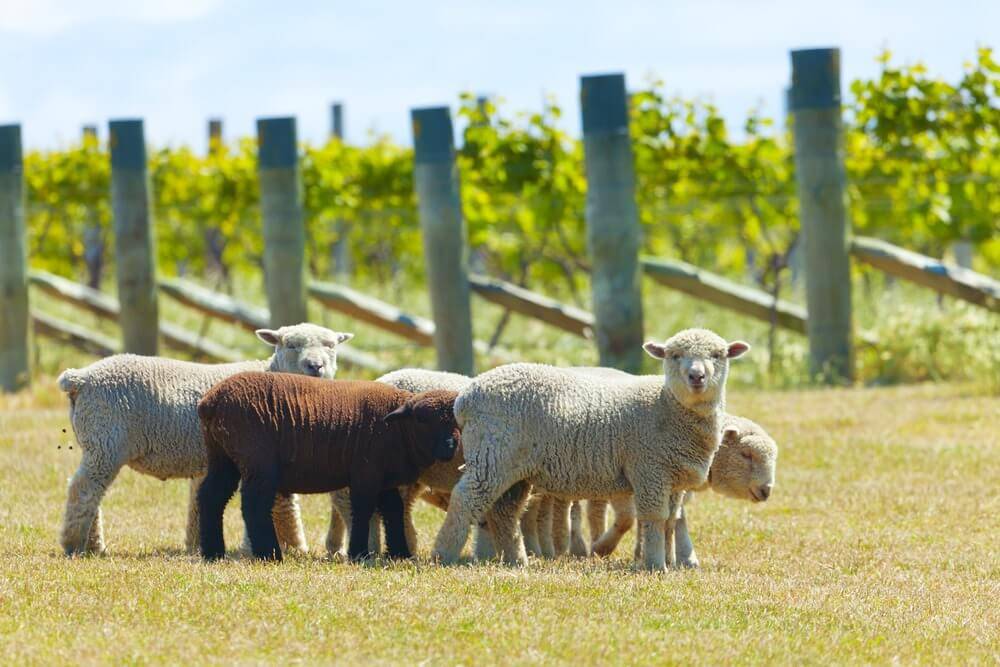
What sets Babydolls apart is their luxurious wool—short, stapled, and incredibly fine at 19-20 microns (similar to cashmere). With more barbs per inch than other wool types, it blends beautifully with mohair, angora, or alpaca to create stronger yarn without sacrificing softness. Their attractive teddy bear faces (primarily white though occasionally blacks appear) and horn-free heads on both males and females add to their appeal. Through our breeding program, we’ve focused on preserving these tiny bloodlines while maintaining excellent temperament, proper conformation, and the finest fiber quality according to Olde English Babydoll Registry standards—a balance that has taken years to perfect but produces consistently adorable and functional farm animals.
Eating Habits
After ten years of raising babydolls on my farm, I’ve discovered they excel at keeping weeds at bay while clearing large areas of vegetation. Many owners have reported that these sheep selectively eat weeds and spare landscaping shrubs and fruit trees – though in my personal experience, mine rarely hesitate before munching on rose bushes and young trees! This is precisely why I invested in sturdy fencing to define their parameters. When managed properly, these little grazers have a remarkably gentle, positive impact on the landscape. One essential practice I’ve adopted is waiting until late morning (typically after 11 AM) to let them graze, ensuring all dew and rain has fully evaporated from the grass and foliage – a simple trick that effectively prevents digestive issues.
The diet of my babydolls combines grazing with carefully measured hay – approximately ½ flake per day per sheep. Don’t be deceived by their dramatic displays of starvation when they claim to be desperately hungry immediately after feeding; that’s just their verbal way of trying to fool you into providing extra treats! Throughout spring through autumn, my flock enjoys fresh orchard grass, while in the colder winter months, I switch to timothy hay to maintain proper nutrition as natural grazing becomes limited.
Proper hydration and mineral balance are equally important for these woolly companions. I keep a large tub of fresh water available at all times, alongside 24-hour access to a bowl of baking soda (which helps with rumination) and sheep minerals (either loose or as a mineral block). This combination of nutrition and hydration practices has kept my flock remarkably healthy year-round. While commercial feeds are available, I’ve found this more natural approach aligns better with how these sheep evolved to eat, resulting in fewer health problems and more consistent wool quality over the changing seasons.
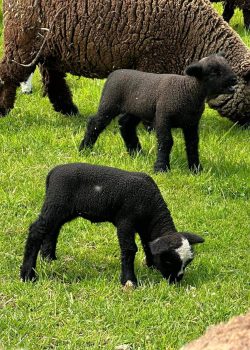
Babydoll Sheep Colors
When I first started my small farm journey, I was captivated by the charming variety of colors that babydoll sheep display. While most come in solid white or black, each animal carries its own special touches that make them unique. My first lamb, Pepper, exemplifies this perfectly with her snowy white body and warm tan face that absolutely melts hearts of visitors. What many new owners don’t realize is that black sheep with their rich dark fleece actually gradually turns browner after spending long hours in the sun – the UV rays naturally lightens their coloring over time, creating subtle variations even within the same animal.
In my decade of breeding experience, I’ve grown particularly fond of the less common spotted and freckled coats that some babydolls develop. Despite being considered blemished and deemed unacceptable for showing under strict breed standards, these uniquely marked lambs are particularly adorable to many enthusiasts. The patchy coloring makes each one truly distinct from the flock. Whether you prefer the classic lighter shades or the more unusual patterns, the color variation contributes significantly to their undeniable charm that has kept me raising these delightful creatures year after year.Some of these woolly creatures display even more unusual patterns – spotted or freckled coats with patchy coloring that make each one distinct. Though considered blemished and unacceptable for showing by strict breed standards, these uniquely marked lambs are particularly adorable in my opinion. Whether you prefer the classic lighter shades or more dramatic color variation, there’s an undeniable charm to these creatures that provides the perfect distraction when you’re wondering about roof acoustics during storms.
Temperament and Hardiness
After having raised these animals for over fifteen years, I can honestly say that babydoll sheep possess a truly special quality that makes them stand out among other livestock. Their wonderful combination of gentle temperaments and extreme hardiness represents a rare pairing in farm animals. This breed has consistently shown itself to be remarkably easy-going and sweet, making them enjoyable to work with regardless of whether you manage a small hobby farm or a larger operation. What’s impressed me most is how these surprisingly hardy creatures thrive with low-maintenance care – a testament to their robust nature. During harsh winters on my Montana property, I’ve watched as they adapt well to various conditions that would stress other breeds, all while maintaining their calm temperament that makes them perfect for newcomers to shepherding.
Temperament
When you first bring home your Babydolls, don’t expect those instant cuddly moments you might see in farm videos. That magical hug with lambs running to greet you actually takes time and genuine effort. From my experience raising these woolly friends, it took several weeks of spending days working outside near them, often just staying still to spark their curiosity enough to come closer. The investment pays off magnificently though – now my flock meets me every morning for chin scratches, showing how these sheep, while not traditional pets, gradually warm up to become like family when given patience to develop their sweet personalities.
These gentle creatures remain naturally cautious as prey animals but are never aggressive toward humans. You’ll occasionally see them ram each other gently over food or favorite napping spots, or stomp a hoof to alert the group of perceived danger – my watchful ewe Peggy does this whenever the neighboring dog approaches. They’re remarkably perfect with children – my kids love hand-feeding them grain and rubbing their chins, though we teach them to avoid sudden movements that might scare the sheep. The most “wild” behavior you’ll witness is when they get excited by treats like alfalfa – they might buck or jump an adorable inch off the ground, looking so proud of themselves for their athletic feats!
Hardiness
When you’re looking for livestock that can withstand the ups and downs of farm life, Babydoll Sheep stand out as remarkably hardy animals that typically live between 12-16 years with minimal health issues. Unlike many other breeds, these woolly companions are not prone to disease and rarely easily injured, though injuries can certainly occur from unexpected attacks as I discovered firsthand. My beloved lamb Peggy was once attacked by a neighboring dog that mistook her fuzzy ear for a chew toy during an unfortunate fence breach. What amazed me was how she recovered quickly and remains perfectly healthy today despite the scare. One important caution for new owners: these sheep excel at hiding illness, making regular attention and thorough inspections absolutely crucial for maintaining their wellbeing. With proper care, however, I’ve witnessed their incredible ability to bounce back from various health challenges that would seriously impact other breeds – a testament to why they’ve become increasingly popular among small-scale farmers seeking low-maintenance livestock options.
What are Babydoll Sheep good for?
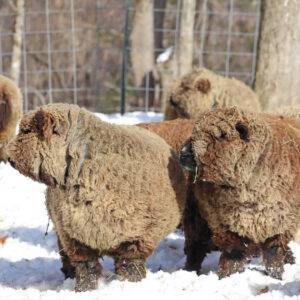
The Perfect Pet Sheep
Natural Lawn Care
Helpful Pruners
Natural fertilizer production
Soft fleece for crafting
Harvesting for Meat
The Perfect Pet Sheep
When you decide between different small livestock options for your hobby farm, I can confidently tell you after working with Babydolls for 12 years that these sheep make exceptional companions. Once acclimated to their environment, they warm up nicely to their owner and provide great company as you work around your property. Unlike miniature goats (those incredible escape artists who keep you busy and constantly on your toes) or sometimes aggressive alpaca, Babydolls remain gentle and much calmer. Though all three have their merits, I’ve found that Babydolls with their diminutive size (standing just 18-24 inches tall) offer the perfect balance – playful enough for joy yet do not get into anything they shouldn’t and are not interested in fighting or breaking out of their paddock or pasture.
What truly sets them apart from other hobby farm pets is how they readily warm to their owner once fully acclimated to their environment. Unlike many animals that remain aloof, these social creatures become great company, often following you around the pasture with quiet curiosity as you work your hobby farm. My lambs, born and raised on-site, have been sold as beloved barnyard pets or rehomed to retirees seeking peaceful companions who appreciate their gentle demeanor. Their adaptability shines particularly in 4-H projects, making them the perfect choice for teaching responsibility to young people without overwhelming children. Whether you’re looking for a productive farm addition or simply affectionate pets, these charismatic Babydolls rarely disappoint. I consistently advise newcomers that they’re especially suitable for young handlers, the elderly, or disabled individuals as they’re far more manageable than those notorious escape artists (goats) or the quite aggressive (alpaca) alternatives, despite goats being wonderful in their own destructive way!
Natural Lawn Care
Imagine the scene: beautiful to watch babydoll sheep dotting your landscape as they work as excellent foragers, transforming how you care for your property. These charming animals naturally keep your grass down while thoughtfully leaving enough growth for the land to thrive. Over the years, I’ve discovered that these animals maintain the perfect balance when grazing our land – their gentle nibbling ensures the sheep pasture grows sufficiently without becoming overgrown, allowing us to harvest hay for the entire herd to enjoy all winter long. Last season, we baled our sheep pasture at just the right time, cutting the tall grasses into small square bales that we could easily stack. We only need to bale a portion of the field, as the flock maintains the rest, and we baled enough for our flock to enjoy hay all winter. These woolly creatures are not only beautiful to look at but practical too – they keep your grass down yet still leave you enough growth to bale and save up for winter feed.
Helpful Pruners
When I first brought Babydoll sheep onto my property, I was amazed at how these adorable creatures, often called the teddy bears of the sheep world, transformed my orchard and vineyard management. These fluffy landscapers were seemingly made specifically for this type of work, as they move diligently through rows, expertly handling vegetation control. Their natural pruning and mowing duties are performed without disturbing the crops – their short stature (typically under 24 inches at the shoulder) provides a tremendous advantage in these agricultural environments. Unlike goats or larger breeds, Babydolls aren’t able to reach the valuable fruit hanging above them, meaning they focus solely on ground vegetation while not disturbing any of the fruit that I’m growing. I’ve watched them work for hours, methodically clearing undergrowth while leaving my produce perfectly intact – nature’s perfect little gardeners!
Natural fertilizer production
Wherever you allow your Babydoll sheep to graze on your property, you’re getting a hidden bonus that you may not realize – these woolly landscapers create a beneficial cycle for your lawn. Unlike dog waste that leaves ugly brown patches in your grass, Babydolls naturally fertilize as they move about. Their tiny nitrogen-rich pellets gently drop and get stomped into the soil as they walk, where the feces rest close to the ground without creating any mess to worry about. You will not create the problems that dogs would, nor will you have to worry about stepping into nasty patties that you need to watch your step around. After raising these sheep for five years, I’ve noticed how their droppings are constantly giving essential nutrients back to the earth – delivering what my pastures need without the issues associated with other animals. It’s quite remarkable to observe how their natural behaviors maintain this perfect balance, allowing you to truly enjoy your land and not have to watch your step while walking through your rejuvenated pastures.
Soft fleece for crafting
Each spring when we shear our babydoll sheep flock, I’m reminded why their fleece is so special among fiber enthusiasts. These adorable sheep produce fibers that are ultra-soft in the 19-24 micron range, making them comparable to cashmere in quality. This premium wool can be comfortably worn close to skin without irritation, a rare quality that makes it highly sought after by crafters. The first time I felt this wool against my skin, I was amazed by its softness – nothing like the scratchy wool sweaters many people associate with sheep!
What makes babydoll wool truly unique are the highly barbed fibers that create exceptional yarn on their own, yet many handspinners love blending it with other luxury fibers. I’ve experimented with adding angora rabbit and angora goat wool to create truly remarkable textiles with depth and character. Every spring after the sheep are sheared, their wool runs through a processing sequence that means it can be worn close to the skin immediately after crafting. Because the wool is highly barbed, you may want to run it with other fibers like angora rabbit or angora goat for certain projects – I’ve found this combination creates the most luxurious scarves and hats that feel wonderful against the skin even on the coldest days.
Harvesting for Meat
While Babydoll sheep were originally bred and raised for meat on traditional family farms years ago, there’s been a noticeable cultural shift in how we view these animals today. Historically, these animals were prized for their particularly tender quality that sells well at market – I’ve heard from old-timers that the meat is very tender and apparently still has value for those seeking heritage breeds. However, after visiting dozens of farms and speaking with breeders across the country, I’ve discovered that most modern shepherds simply can’t bring themselves to continue this practice after working with these gentle creatures for years.
The majority of breeders now refuse to sell their lambs for slaughter, instead choosing to focus on wool production and the animals’ value as grazing companions. When I began researching Babydolls, I was surprised to find that I don’t know of anyone who currently uses them primarily as meat animals as they were used for on the family farm in decades past. While some still raise them for dual purposes, most of us who keep these woolly living lawnmowers with distinct personalities have developed such strong attachments that we could never bring myself to harvest them. I know many breeders who explicitly refuse to sell lambs to buyers who intend to have them bred and raised for meat.
Companions
Babydoll Southdowns prove themselves to be truly wonderful companion animals on any farm, bringing their calm, docile disposition wherever they go. Their soothing effect makes them ideal partners for non-aggressive livestock, getting along beautifully with most species when properly introduced. I’ve found it wise to gradually introduce new arrivals in separate paddocks, giving everyone the opportunity to adjust without feeling overwhelmed. These woolly friends have a strong flocking instinct and genuinely thrive on companionship – they should always have at least one sheep friend, even when kept with other kind of animals. Just remember to avoid pairing them with intact male llamas or alpacas, as these may attempt unwanted breeding behavior that can stress your sheep.
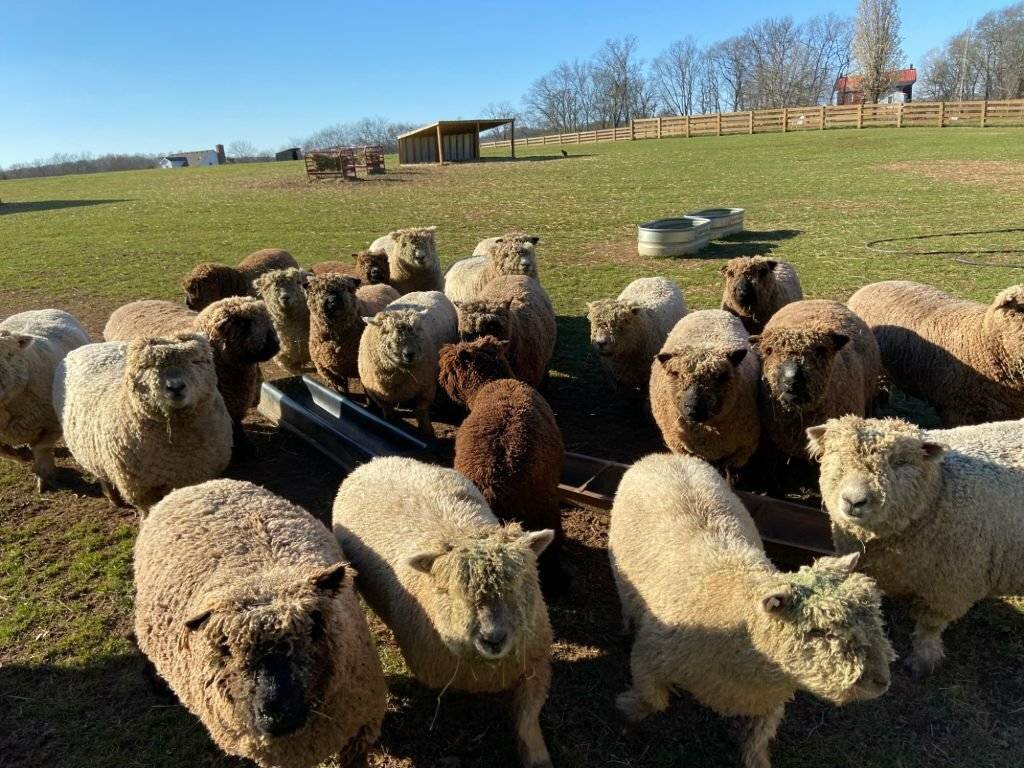
What makes these sheep particularly special is how they become excellent companions for children too. On my small homestead, I’ve raised several from lambs, each developing distinct, lovable personalities while maintaining gentle temperaments. There’s Zeus and Thor, who demand ear scratches and follow us everywhere around the property, while Hercules (though more timid) will loudly voice his opinion at dinner time if we forget his favorite fruit. Then there’s Maximus, our brown leader – the fastest eater in the group and consequently the most rotund in our flock! Their patience makes them perfect for young helpers learning animal care, proving you don’t have to choose between important farm workers and lovable family members when you bring Babydolls to your homestead.
Vineyards and Orchards
After spending years working with various livestock solutions, I’ve witnessed how Babydolls have truly revolutionized agricultural approaches across America. These small size sheep with their gentle nature have become ideal workers in commercial vineyards, apple orchards, and blueberry fields. Unlike larger animals that cause destruction, these woolly assistants delicately navigate between fruit trees and berry bushes without damaging developing fruits or girdling trunks. Their ability to graze year-round (except during July blueberries harvesting) makes them incredibly effective for farmers implementing sustainable and regenerative practices.
What makes my flock so valuable is how they function as living lawnmowers that work quietly while keeping grass down and clean up windfall fruit. As they move through small farm operations, they’re constantly naturally fertilizing the soil and distributing nutrients precisely where needed, eliminating dependency on chemical fertilizers. I’ve seen firsthand how these creatures avoid damaging shrubs while transforming integrated land management across various growing environments. The way they handle both vineyards and other specialty crops without disturbing the delicate balance has made them essential partners in modern agriculture.
Shearing Babydoll Sheep Fleece & Loving Their Wool
Managing your Babydoll’s fleece requires understanding the seasonal challenges – particularly the hard wax buildup that makes April shearing nearly impossible. Through my years of owning sheep, I’ve found that scheduling early spring or fall sessions (or waiting until June when the woolhair has released) yields the best results. Finding helpful shearers who travel across the country to provide this service isn’t difficult through word of mouth or local farming connections near you. Don’t worry – proper shearing doesn’t hurt the sheep! Honestly, when done properly, it’s like a spa day for them – they love it! Just remember that occasional trim around the eyes is necessary for their comfort, and avoiding unshorn animals prevents cotted fleeces.
If you’re new to processing, dying and spinning your own yarn, don’t be intimidated. Yes, it feels daunting at first, but there’s a learning curve everyone climbs with patience. I’ve watched complete beginners master these skills and create stunning pieces. Alternatively, your community may have crafters eager to get hands on with your beautiful, soft fleece. The results are worth it – Babydoll wool ranks among the finest of all British breeds, prized for its dense, incredibly soft texture that offers warmth without any scratchy feel. The exceptional quality comes from its short (2-3 inches) springy fibers with more barbs per inch than other wools. With a micron range of 19-29 (comparable to cashmere), this bouncy material feels comfortably soft against the skin and provides excellent cushion and elasticity for projects like socks, mittens, hats, blankets, and sweaters. The wool’s strong disposition and durability make it perfect for needle-felting and woven goods, while its low wet felt quality makes it surprisingly versatile for blending with fibers like angora.
Babydoll Sheep Care
After raising these gentle creatures for over a decade, I can confidently say that Babydoll sheep are the definition of hardy and low maintenance—truly perfect for small hobby farms. You can comfortably house about five per acre, making them wonderful additions to even modest properties. Their care is remarkably simple once you master reading your sheep for signs they might be ill or injured. For housing, a basic three-sided shed with a roof provides adequate shelter—though we use an open-air barn that we lock at night for predator protection. In warmer climates, install fans to prevent overheating in summer, but avoid insulated structures as these animals don’t handle drastic temperature changes well (keep temperatures within 15 degrees of outside temps). My lambs always seem happiest when their space is dry and warm without being stuffy. Regarding containment, focus on predator-proof options like panel fencing or hog panel—I’ve found portable electric mesh works well too. These creatures rarely challenge fences or wonder far, so it’s less about keeping them in and more about keeping predators out.
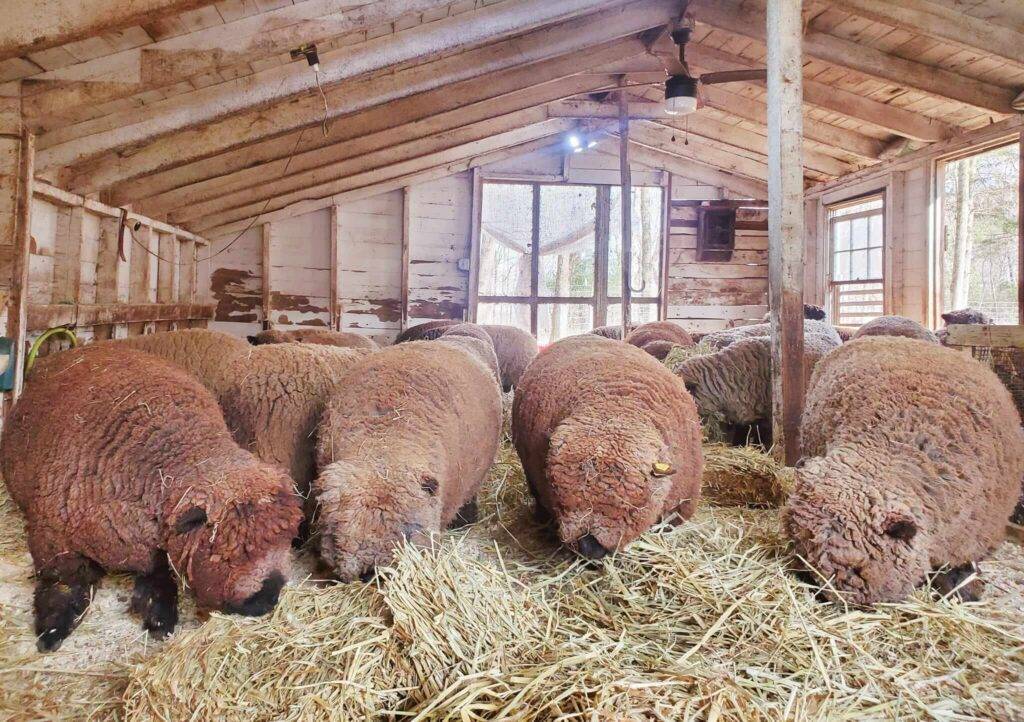
The dietary needs of Babydolls are refreshingly straightforward. They happily graze on most grasses during growing seasons and eat quality hay in winter. Every afternoon, my flock gets excited when they see me approaching with fresh hay—they actually play in it before settling down to eat! For additional nutrition, I mix in some alfalfa occasionally, which they absolutely love. You can hand-feed them grain treats to help them warm up to you and build trust. Their water requirements are simple but critical—maintain clean water containers to prevent larvae growth. Don’t forget that salt and mineral blocks are essential supplements, but remember: never give sheep anything containing copper as it’s toxic to them. Through years of experience, I’ve found their resilient nature means they typically require little human intervention with proper baseline care.
Routine care for Babydolls follows a predictable yearly cycle. Plan for shearing every spring (typically March/April), which reveals their adorable faces and prevents wool from growing quickly around their eyes and body. While I don’t groom mine for shows, I do check and trim hooves twice a year (or every quarter if your soil is soft). During fall and winter, I trim around their eyes if wool grows too long so they can see better. Keep Ivermectin Sheep Drench on hand for those rare parasite issues that might emerge. During lambing time, I provide individual stalls for a few days to help new moms bond with their babies, though these sheep typically have easy births and display strong mothering instinct—producing vigorous lambs that bounce around within hours of birth. After years of raising these charming creatures, I’ve come to appreciate how their self-sufficient nature makes them ideal for hobby farmers seeking livestock that doesn’t demand constant attention.RetryClaude can make mistakes. Please double-check responses.
Lambs and Breeding
When I started my journey with these adorable creatures, I quickly learned that finding a reputable breeder is incredibly important for healthy, well-adjusted animals. Look for sheep that are registered with the North American Babydoll Southdown Sheep Association & Registry, as this ensures you’re getting true Babydolls with traceable lineage and proper paperwork. If you’re interested in breeding, understand that lambs are born in spring after a 145-day gestation period, with each ewe or mother sheep delivering typically 1-2 lambs per birthing. These little ones are naturally fed by their mothers, though occasionally some might need to be bottle-fed if the mother rejects them or has multiple babies. From my experience raising three generations of Babydolls, the youngsters are generally ready for their new homes between 60-80 days after birth—just when their personalities are starting to shine through!